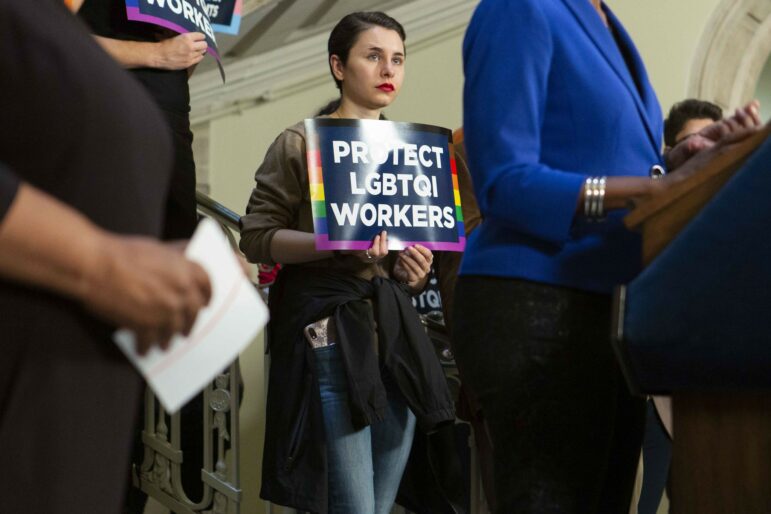“Between chronic underfunding, a change in administration, and pandemic staff shortages, the process of filing and resolving complaints at the Commission has slowed to a standstill. Mayor Eric Adams’s current budget contains even more cuts to the commission which do nothing but create unnecessary harm to everyday New Yorkers.”

Emil Cohen/NYC Council
Advocates and lawmakers at a 2019 City Council press conference on workplace discrimination protections.Erica, a 20-year-old transgender woman living in Manhattan, has been job-hunting for months. On paper, she’s qualified for every position she applies to, but when she shows up to interview, she’s greeted with hostility and derision, like when employees yelled anti-trans slurs at her during the interview.
Erica’s experience with this type of gender-based discrimination is not uncommon. A recent study found that transgender employees face disproportionately higher rates of discrimination (being fired or not hired) in their work lives, compared to cisgender workers. For trans and gender nonconforming New Yorkers, there present even greater risks of harassment and violence in the workplace. This discrimination takes place in an environment where anti-trans sentiment looms large nationwide, and many Americans remain skeptical of their trans neighbors. Even more disheartening than the statistics are the shockingly few remedies for recourse available to workers like Erica and countless others like her in New York City.
Years ago, the New York City Human Rights Commission, the agency that prohibits discrimination in employment, housing, and public accommodations, was a powerhouse for ensuring accountability by city agencies. New York City—which has long touted itself a bastion of civil rights—has a Commission that has continued to receive significantly less funding in its budget per capita than smaller progressive cities like San Francisco, Washington D.C., and Seattle.
Between chronic underfunding, a change in administration, and pandemic staff shortages, the process of filing and resolving complaints at the Commission has slowed to a standstill. Mayor Eric Adams’s current budget contains even more cuts to the commission which do nothing but create unnecessary harm to everyday New Yorkers.
New Yorkers like Jane, a transgender woman who works in food service and experienced the effect of the delays at the Commission firsthand when she decided to fight back against severe workplace discrimination and assault on the basis of her gender identity. With the support of attorneys at Make the Road NY, Jane filed a complaint with the Commission, then discovered that it took three months just to generate a complaint number for her case.
Or John, a low-wage delivery driver who filed a discrimination complaint with the Commission, only to have it languish for nearly three years before a determination was made, and another year to reach a settlement. John is still waiting on a check. Jane, John, and Erica have attorney support, but pro se complainants face even worse delays. Unfortunately, the proposed cuts to the Commission, including a $2.7 million cut to the Law Enforcement Bureau that’s tasked with investigating and prosecuting of complaints, will make it even harder for those workers to have their complaints see the light of the day.
The New York City Council will convene Monday to discuss important expansions to the Human Rights Law. But as budget negotiations draw to a close, we urge the Mayor and the City Council to also take action to staff the Commission back to pre-pandemic levels and make sure that the Commission is able to actually enforce New Yorkers’ civil rights.
During the prior fiscal year, the Commission fielded a record 11,942 inquiries from members of the public alleging discrimination, and yet the agency only resolved 667 filed cases. The average time that filed complaints were pending at the Commission was 689 days—nearly 23 months. If this trend continues, complaints will only continue to pile up, unresolved. For many vulnerable workers experiencing discrimination, the delays at the Commission mean their harassment will go unreported and unaddressed.
We urge the Mayor and the City Council to increase funding for the Commission. Mayor Adams recently told the LGBTQ+ community that New York City “hears you, sees you, and embraces you.” But will the City defend you from discrimination? And who will enforce those laws? The city needs to fully invest in and support the Commission. That means adding more qualified staff, improving processing times, and retaining staff committed to ensuring that vulnerable New Yorkers will receive redress after experiencing discrimination.
If the Commission cannot adequately enforce our laws, trans and queer New Yorkers will be left without hope. Pride month is a time to commemorate the struggles we have had. Parties and celebrations bring joy to the community, but we also unite to ask Mayor Adams and the City Council to put money where their words are and give New Yorkers the justice they deserve.
Amy Leipziger is the Project Director of the Free to Be Youth Project of the Urban Justice Center. Teddy Watler is a Peggy Browning Fellow at the Workplace Justice Project at Make the Road NY.








